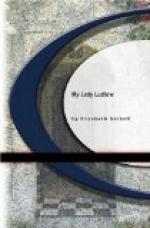I came by degrees to be all day long in this room which I have been describing; sometimes sitting in the easy-chair, doing some little piece of dainty work for my lady, or sometimes arranging flowers, or sorting letters according to their handwriting, so that she could arrange them afterwards, and destroy or keep, as she planned, looking ever onward to her death. Then, after the sofa was brought in, she would watch my face, and if she saw my colour change, she would bid me lie down and rest. And I used to try to walk upon the terrace every day for a short time: it hurt me very much, it is true, but the doctor had ordered it, and I knew her ladyship wished me to obey.
Before I had seen the background of a great lady’s life, I had thought it all play and fine doings. But whatever other grand people are, my lady was never idle. For one thing, she had to superintend the agent for the large Hanbury estate. I believe it was mortgaged for a sum of money which had gone to improve the late lord’s Scotch lands; but she was anxious to pay off this before her death, and so to leave her own inheritance free of incumbrance to her son, the present Earl; whom, I secretly think, she considered a greater person, as being the heir of the Hanburys (though through a female line), than as being my Lord Ludlow with half a dozen other minor titles.
With this wish of releasing her property from the mortgage, skilful care was much needed in the management of it; and as far as my lady could go, she took every pains. She had a great book, in which every page was ruled into three divisions; on the first column was written the date and the name of the tenant who addressed any letter on business to her; on the second was briefly stated the subject of the letter, which generally contained a request of some kind. This request would be surrounded and enveloped in so many words, and often inserted amidst so many odd reasons and excuses, that Mr. Horner (the steward) would sometimes say it was like hunting through a bushel of chaff to find a grain of wheat. Now, in the second column of this book, the grain of meaning was placed, clean and dry, before her ladyship every morning. She sometimes would ask to see the original letter; sometimes she simply answered the request by a “Yes,” or a “No;” and often she would send for lenses and papers, and examine them well, with Mr. Horner at her elbow, to see if such petitions, as to be allowed to plough up pasture fields, were provided for in the terms of the original agreement. On every Thursday she made herself at liberty to see her tenants, from four to six in the afternoon. Mornings would have suited my lady better, as far as convenience went, and I believe the old custom had been to have these levees (as her ladyship used to call them) held before twelve. But, as she said to Mr. Horner, when he urged returning to the former hours, it spoilt a whole day for a farmer, if he had to dress himself




